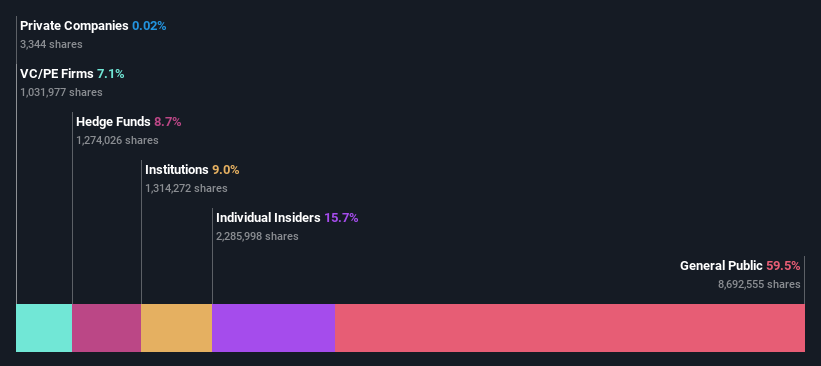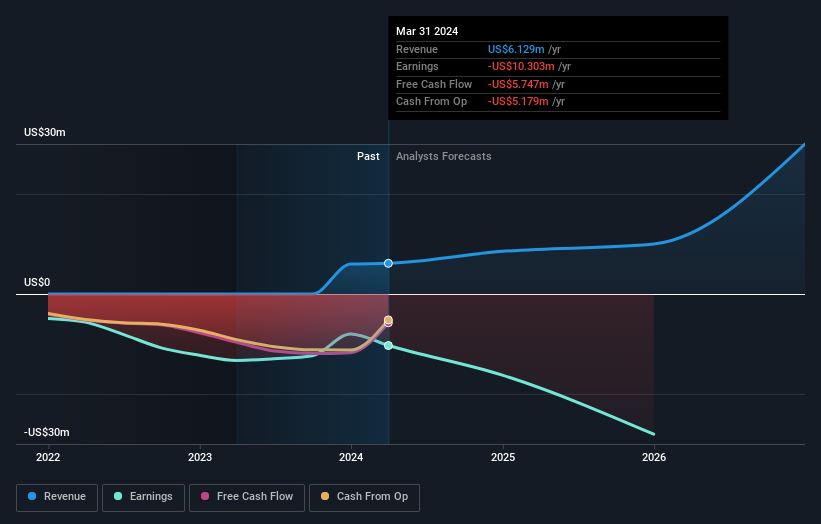Coya Therapeutics, Inc.'s (NASDAQ:COYA) largest shareholders are retail investors with 60% ownership, insiders own 16%
Key Insights
The considerable ownership by retail investors in Coya Therapeutics indicates that they collectively have a greater say in management and business strategy
The top 25 shareholders own 40% of the company
If you want to know who really controls Coya Therapeutics, Inc. (NASDAQ:COYA), then you'll have to look at the makeup of its share registry. With 60% stake, retail investors possess the maximum shares in the company. In other words, the group stands to gain the most (or lose the most) from their investment into the company.
And individual insiders on the other hand have a 16% ownership in the company. Institutions often own shares in more established companies, while it's not unusual to see insiders own a fair bit of smaller companies.
Let's take a closer look to see what the different types of shareholders can tell us about Coya Therapeutics.
See our latest analysis for Coya Therapeutics
What Does The Institutional Ownership Tell Us About Coya Therapeutics?
Many institutions measure their performance against an index that approximates the local market. So they usually pay more attention to companies that are included in major indices.
As you can see, institutional investors have a fair amount of stake in Coya Therapeutics. This can indicate that the company has a certain degree of credibility in the investment community. However, it is best to be wary of relying on the supposed validation that comes with institutional investors. They too, get it wrong sometimes. If multiple institutions change their view on a stock at the same time, you could see the share price drop fast. It's therefore worth looking at Coya Therapeutics' earnings history below. Of course, the future is what really matters.
Our data indicates that hedge funds own 8.7% of Coya Therapeutics. That catches my attention because hedge funds sometimes try to influence management, or bring about changes that will create near term value for shareholders. Greenlight Capital, Inc. is currently the company's largest shareholder with 8.7% of shares outstanding. Aigh Capital Management, LLC is the second largest shareholder owning 7.1% of common stock, and Howard Berman holds about 6.5% of the company stock. Howard Berman, who is the third-largest shareholder, also happens to hold the title of Chairman of the Board.
On studying our ownership data, we found that 25 of the top shareholders collectively own less than 50% of the share register, implying that no single individual has a majority interest.
While it makes sense to study institutional ownership data for a company, it also makes sense to study analyst sentiments to know which way the wind is blowing. There is some analyst coverage of the stock, but it could still become more well known, with time.
Insider Ownership Of Coya Therapeutics
The definition of an insider can differ slightly between different countries, but members of the board of directors always count. Company management run the business, but the CEO will answer to the board, even if he or she is a member of it.
I generally consider insider ownership to be a good thing. However, on some occasions it makes it more difficult for other shareholders to hold the board accountable for decisions.
It seems insiders own a significant proportion of Coya Therapeutics, Inc.. Insiders own US$18m worth of shares in the US$118m company. This may suggest that the founders still own a lot of shares. You can click here to see if they have been buying or selling.
General Public Ownership
The general public, mostly comprising of individual investors, collectively holds 60% of Coya Therapeutics shares. This size of ownership gives investors from the general public some collective power. They can and probably do influence decisions on executive compensation, dividend policies and proposed business acquisitions.
Private Equity Ownership
With an ownership of 7.1%, private equity firms are in a position to play a role in shaping corporate strategy with a focus on value creation. Some might like this, because private equity are sometimes activists who hold management accountable. But other times, private equity is selling out, having taking the company public.
Next Steps:
While it is well worth considering the different groups that own a company, there are other factors that are even more important. Take risks for example - Coya Therapeutics has 3 warning signs (and 1 which is significant) we think you should know about.
If you would prefer discover what analysts are predicting in terms of future growth, do not miss this free report on analyst forecasts.
NB: Figures in this article are calculated using data from the last twelve months, which refer to the 12-month period ending on the last date of the month the financial statement is dated. This may not be consistent with full year annual report figures.
Have feedback on this article? Concerned about the content? Get in touch with us directly. Alternatively, email editorial-team (at) simplywallst.com.
This article by Simply Wall St is general in nature. We provide commentary based on historical data and analyst forecasts only using an unbiased methodology and our articles are not intended to be financial advice. It does not constitute a recommendation to buy or sell any stock, and does not take account of your objectives, or your financial situation. We aim to bring you long-term focused analysis driven by fundamental data. Note that our analysis may not factor in the latest price-sensitive company announcements or qualitative material. Simply Wall St has no position in any stocks mentioned.

 Yahoo Finance
Yahoo Finance 

